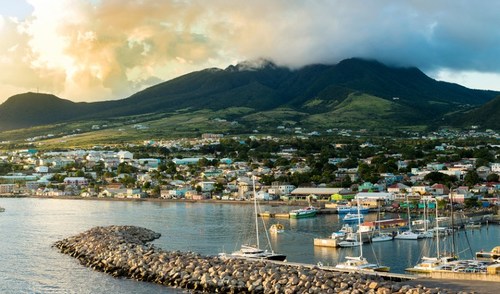St Kitts and Nevis Moves Ahead with Plans to Ban Single-Use Plastics

LONDON, Feb. 23, 2022 /PRNewswire/ — The impacts of plastic waste on the environment and our health are global, drastic and countries around the world are enforcing plastic bans. As the call to end single-use plastics gets louder, the nation of St Kitts and Nevis is moving ahead with its plan to combat plastic pollution and promote a healthy environment.
The world now produces more than 380 million tonnes of plastic every year, which could end up as pollutants entering the natural environment and oceans.

According to Statista, plastics accounted for 12 percent of the municipal solid waste generated in the U.S. in 2018, however just 8.7 percent of the volume of plastic waste was recycled that year.
“There appears to be a growing trend in the USA where High Net-Worth Individuals (HNWIs) are looking at sustainable countries, some of which embrace a plastic-free way of life. Investing in these economies not only ticks an ecological box but also delivers them second citizenship as a valuable by product of the investment,” says Paul Singh, a director at CS Global Partners – one of the leading government advisory and marketing firms in the world, specialising in residency and citizenship by investment solutions.
St Kitts and Nevis adopts a collaborative approach to reducing plastic waste
Last year, St Kitts and Nevis’ Department of Environment commenced a series of consultations with relevant stakeholders in the proposal to ban single-use plastics in the country.
The consultation was held in April 2021 under the theme “Are you Ready to be Plastic Free?”
The stakeholder meeting was attended by representatives from the Department of Consumer Affairs, the Small Business Development Centre, the Ministry of International Trade, Solid Waste Management Corporation, the Ministry of Environment and Cooperatives, and Ital Creations.
The next round of consultations will continue with the private sector this year.
“The Ministry of Environment is consulting with relevant stakeholders to implement a ban on single-use plastics, following in the footsteps of several Caribbean countries that have already done so,” said Sharon Rattan, St Kitts and Nevis’ Permanent Secretary in the Ministry of Environment and Cooperatives.
Several Caribbean island nations have already banned the use of single-use plastics, among them Jamaica, Dominica, Turks and Caicos and Barbados.
“One of the things that the ministry is endeavouring to do is to make sure we have meaningful collaboration so that we can make informed decisions because we are quite aware that such a ban cannot be done overnight,” added Permanent Secretary Rattan.
Minister of Environment and Cooperatives, the Honourable Eric Evelyn, said at the consultation that the banning of single-use plastic bags is “long overdue and the talk about banning single-use plastic bags has been around for some time and I believe the time is right now for us to act. There has been a lot of talks but there has not been a lot of action, and I believe the time is right.”
Since becoming the environment minister in 2020, Honourable Evelyn submitted a proposal to Cabinet to ban single-use plastics. The proposal, he said, received the blessing of every member.
Minister Evelyn noted the importance of banning single-use plastics because of the significant number of plastics generated yearly, and how these plastics are a burden on the country’s landfill as they are not biodegradable. Plastics also end up in the ocean and have a devastating impact on marine life.
The country’s Ministry of Tourism and Sustainable Destination Council (SDC) joined forces in advocating for the ban of single-use plastics in 2018 and started an initiative called Plastic Free July. The initiative aims to educate citizens on the ways plastic pollution threatens marine life, personal health, and the islands tourism product.
St Kitts and Nevis’ rules on single-use plastic products aim to prevent and reduce the impact of certain plastic products on the environment, particularly the marine environment, and human health.
They also aim to promote the transition to a circular economy with innovative and sustainable business models, products, and materials, therefore also contributing to the efficient functioning of the internal market.
Plastic-free champion
Plastic Free July is a month-long campaign that runs annually in St Kitts and Nevis, it encourages residents and businesses to take part in the action-filled agenda that hopes to change people’s behaviour around the reliance of single-use plastics.
Diannille Taylor-Williams, Assistant Secretary in the Ministry of Tourism, said, “We must continue to consider the trajectory of our long-term well-being, and our actions play a significant role in ensuring a sustainable future for our island-home and the generations to come – a future in which single-use plastics is not a threat to the health of our communities and viability of our environment.”
The Plastic Free July initiative is part of the Sustainable Destination Council’s broader “Plastics Be Gone” initiative, which aims to reduce the amount of single-use plastics consumed in St Kitts and Nevis by at least 30% over the next five years.
The SDC was established in 2013 and has been tirelessly facilitating collaboration across different sectors around destination stewardship and pursuing leading practices in sustainable development.
The SDC’s goal is focused on the overall well-being of St Kitts and Nevis and is enacting its five-year plan focused on Community Involvement and Benefits, Culture and Natural Heritage and Environment and Destination Management.
The “Plastics Be Gone” initiative was identified as one of the destination-stewardship projects the SDC will implement to combat the threat that plastic pollution poses to the future of St Kitts and Nevis’ ecosystems, communities, and destination appeal.
Although the SDC and its partners continually champion the “Plastics Be Gone” initiative all year long, the Plastic Free July campaign reinforces the magnitude of the SDC’s dedication to mitigating the harmful effects of single-use plastics.
Using its Citizenship by Investment programme to fund climate resilient initiatives
Last year, the government of St Kitts and Nevis submitted its strategy on how it would prioritise climate resilience. Titled ‘Nationally Determined Contribution’ (NDC), the document was submitted to the United Nations Framework Convention on Climate Change (UNFCCC) and was then presented COP26 last November.
The strategy highlights a financing and implementation approach that will mobilise support for its climate goals and position the island as an eco-friendly destination committed to the environment.
Part of the funding from the country’s Citizenship by Investment (CBI) Programme will be funnelled into programmes that support climate resilience.
“Sustainable tourism is an important part of our economy. St Kitts and Nevis’ climate action plan will cater to a growing sustainability travel trend while aiming to reduce its environmental footprint,” said Prime Minister Timothy Harris at the wings of COP26.
In 1984, the Government of St Kitts and Nevis created the world’s first CBI programme which is now regarded as the Platinum Standard and offers reputable investors from all over the world the chance to get the full benefits of citizenship of the twin-island Federation.
The programme was ranked first by The Financial Times’ PWM magazine among 14 jurisdictions worldwide and offers investors a safe and secure route to second citizenship once they contribute to the Sustainable Growth Fund.
Contact: pr@csglobalpartners.com, http://www.csglobalpartners.com
SOURCE CS Global Partners
Leave a comment
You must be logged in to post a comment.